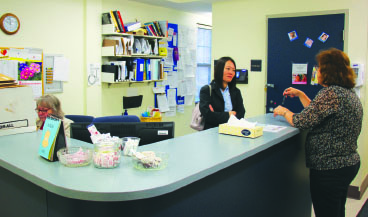
The integration of the health center into the community has raised concern regarding counselor-student confidentiality.
In the past two weeks, I have explored support systems and competition at Choate. This week, I will examine the Pratt Health Center in depth, looking at the diversity in staffing and the student-counselor confidentiality.
A major recurring theme when interviewing members of the community on mental health is the contentious relationship that some believe exists between students and the Pratt Health Center. Jerri Norman ’17, a leader of the Choate Diversity Student Association’s (CDSA) Mental Health Campaign, said, “There is a perception that people in the health center aren’t happy to help or are rushing you around. People just feel uncomfortable.”
The lack of comfort that Norman alluded to is attributed to anecdotes depicting counselors as out of touch and even antagonistic towards students’ needs. Misconceptions are abound on campus, which is why student clubs like CDSA, and now Mental Health at Choate, are trying to educate the community on mental health and the services that are available.
Martha Zhang ’16 believes that some of these efforts work, saying, “I think that it’s definitely getting better – the perception of both med leave and the counseling center.” However, she added, “I think there are a few things that people still don’t understand about the health center.”
Some of these misunderstandings have to do with diversity within the Health Center. Some students believe that the counselors aren’t representative of the Choate community at large.
Elena Turner ’17 said, “The counselors are white, cis-gender, straight ladies. The lack of diversity is prominent in the counseling office.”
Turner believed that the lack of diversity, especially lack of diversity in sexual orientation, led to a misunderstanding between her and her counselor. “I was having issues with my sexuality. I brought it to my counselor, which was a huge mistake. When I came out, there were noticeable differences. She didn’t understand what my sexuality meant. She said I wouldn’t understand sexuality until I was 18, so I shouldn’t come out to people because there is no way that I can be sure about this, and I shouldn’t put myself in that box.”
While Zhang, on the other hand, has maintained a good relationship with her counselor, she supported Turner’s comments, saying, “People still have personalities, regardless of whether they are counselors or not, so maybe we need more counselors. Counselors who aren’t white women or counselors who deal with only gender issues.”
These concerns regarding diversity aren’t lost on those who work in the Health Center. Ms. Charlotte Davidson, Director of Counseling, acknowledged students’ concerns and spoke about the work that the Health Center is doing to compensate for the lack of diversity. “We have had African-American therapists in the past, but they have gone onto other jobs. However, we have other people who we know and can utilize.”
Dr. Christopher Diamond, Director of Health Services, elaborated on Ms. Davidson’s comments, saying, “I’m very aware that I walk into this job as a middle-aged, white male who is a product of a racist, sexist, hetero-centric, gender binary focused culture. The one thing I try is to be as open and accessible to the needs of a diverse population.”
He mentioned that the Health Center needed to demonstrate trust among Choate’s diverse student body and that “there has to be a sense of understanding when we address cultural groups or folks with certain identifiers who don’t feel safe coming here.”
This need to demonstrate trust doesn’t only pertain to students from diverse backgrounds on campus. Another issue that students and alumni mentioned when speaking about the Health Center was confidentiality between the counselors and students.
Grace Alford Hamburg ’14 echoed these sentiments, remarking, “On one hand, you want a counseling center that’s on campus and easily accessible for students, but on the other, the way Choate is constructed means those very counselors are part of the community.” She believed that counselors who were integrated into the community would have a harder time maintaining confidentiality because they personally know the classmates, teachers, and deans that students might talk about during sessions.
Ms. Bender disagreed with these comments, saying that if counselors are involved in the community, it helps normalize accessing support for mental health. “Students will think, ‘This is a person who is out there and teaches and seems okay and maybe I can go talk to them.’”
Dr. Diamond acknowledged that the work the Health Center staff does with individual students, saying that they work behind what he calls the “iron curtain of clinical care.” At the same time, he did not believe that confidentiality was absolute, saying, “The moment a person is an imminent risk to themselves and others, confidentiality is dropped.”
This viewpoint on confidentiality isn’t limited to the Health Center. Ms. Nancy Miller, the Fourth Form Girls’ Dean, described the Health Center’s relationship with the deans as “a two-way street.” She said, “When the deans are worried about someone, they speak to the health center and vice-versa. We, the deans, are very much aware of the fact that there are confidentiality rules that apply to the Health Center and we respect those rules, but often there is the bare bones, skeletal information that is shared with the dean.”
Still, good intentions might not be enough to convince some members of the Choate community to reach out to mental health services. As Norman said, “The relationship that students have with the health center hasn’t been great so far and it’s going to be hard to change that.”
However, Dr. Diamond offered some measures that the Health Center could implement to better its relationship with the student body. “My goal would be to institute patient or client satisfaction surveys, so that every student gets an opportunity to give feedback on a visit. You need in a medical setting constant quality assurance, quality control, and quality improvement. Right at this moment, we don’t have all those things.”
He also mentioned implementing an advisory council for the Health Center that would be comprised of students, faculty, staff, alumni, and parents and would help identify ways to reach out to and educate the community.
Future reforms don’t only have to be implemented internally. Ms. Bender said, “Over the years we probably haven’t been making as many changes as we could be, but I think that this is an opportune time for kids to speak out because the school seems to be looking to make these changes.”


